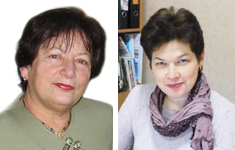Abstract
Improving the information technology opens up new possibilities for productivity of the learning process. The emergence of pedagogical tools for creating e-learning resources, allows the teacher to plan not only the course of the lesson, but also educational and cognitive pupils’ activity taking into account their individual characteristics. In the article it is presented the structural-functional model of future elementary school teachers training to design e-learning resources, criteria and indicators of formation of future teachers readiness for such activities, as well as description and the results of the developed model experimental introduction into the educational process.References
Кузьмина Н.В. Профессионализм деятельности преподавателя и мастера производственного обучения профтехучилища / Н.В.Кузьмина. – М.: Высш. шк., 1989. – 118 с.
Сластенин В.А. Формирование личности учителя советской школы в процес се профессиональной подготовки / В.А. Сластенин. – М.: Просвещение, 1987. – 159 с.
Муравьева Г.Е. Дидактическое проектирование: Монография /Г.Е.Муравьева. – Шуя: Изд-во ШГПУ, 2000. – 84 с.
Краевский В.В. Теоретические основы процесса обучения в советской школе. / В. В. Краевский, С.И.Высоцкая и др. – М.: Педагогика, 1983.
Харламов И.Ф. Педагогика /И.Ф.Харламов. – М.: Гардарики, 1999. – 520 с.
Dym C. Engineering design thinking, teaching and learning / C.Dym, A.Agogino, O.Eris, D.Frey, L.Leifer // Journal of Engineering Education. – № 94 (1). – P.103–120.
Рибалко О.О. Створення та застосування інтерактивних електронних таблиць на уроках математики в початкових класах [Електронний ресурс] / О.О. Рибалко // Інформаційні технології і засоби навчання. – 2016. – №3 (53). – Режим доступу : http://journal.iitta.gov.ua/index.php/itlt/article/view/1373/1042 (in Ukrainian).
National Educational Technology Standards for Teachers [Electronic resource]. – 2008. – Режим доступу: http://www.iste. org /docs/pdfs/nets-t-standards.pdf?sfvrsn=2
Штофф В. А. Моделирование и философия / В. А. Штофф. – М.-Л. : Наука, 1966. – 301 с.
Олефіренко Н.В. Теоретичні і методичні засади професійної підготовки майбутніх учителів початкової школи до проектування дидактичних електронних ресурсів. : автор. … д-ра.пед.н. : спец. 13.00.04 «Теорія та методика професійної освіти» / Н.В.Олефіренко – ХНПУ імені Г.С. Сковороди, Харків, 2015. – 40 с.
REFERENCES (TRANSLATED AND TRANSLITERATED)
Kuzmyna N.V. The professionalism of activity of the teacher and master of industrial training vocational / N.V.Kuzmyna. – M.: Vushaja shkola., 1989. – 118 p. (in Russian)
Slastenyn V.A. Formation of the person of the Soviet school teachers in the process of training/ V.А. Slastenyn. – М.: Prosveshhenye, 1987. – 159 p. (in Russian)
Muravj'eva G.Е. Didactic designing: Monograph/ Muravj'eva G.Е. – Shuja: SHNPU, 2000. – 84 p. (inRussian)
Kraevskyj V. V. Theoretical basis of the learning process in the Soviet school. / [Kraevskyj V. V., Vusockaja S. I. and etc. ] – М.:Pedaghoghyka, 1983. (in Russian)
Kharlamov I.F. Pedagogy /I.F. Kharlamov. – М.: Ghardaryky, 1999. – 520 с. (in Russian)
Dym C. Engineering design thinking, teaching and learning / C.Dym, A.Agogino, O.Eris, D.Frey, L.Leifer // Journal of Engineering Education. – № 94 (1). – P.103–120. (in English)
Rybalko O.O The creation and us of interactive spreadsheets on lessons of mathematics in primary school [online] / О.О. Rybalko O.O // Information technologies and learning tools. – 2016. – №3 (53). – Available from: http://journal.iitta.gov.ua/index.php/itlt/article/view/1373/1042 (in Ukrainian)
National Educational Technology Standards for Teachers [online]. – 2008. – Available from: http://www.iste. org /docs/pdfs/nets-t-standards.pdf?sfvrsn=2. (in English)
Shtoff V. A. Modeling and philosophy/ V. А. Shtoff. – М.-L. : Nauka, 1966. – 301 с. (in Russian)
Olefirenko N.V. Theoretical and methodological foundations for training primary school teachers to design e-learning resources. : The thesis for Doctor degree in Pedagogic: spec. 13.00.04 «the Theory and Methods of Professional Education» / Olefirenko N.V. – H.S. Skovoroda Kharkiv National Pedagogical University, 2015. - 40 с. (in Ukrainian)
Authors who publish in this journal agree to the following terms:
- Authors hold copyright immediately after publication of their works and retain publishing rights without any restrictions.
- The copyright commencement date complies the publication date of the issue, where the article is included in.
Content Licensing
- Authors grant the journal a right of the first publication of the work under a Creative Commons Attribution-NonCommercial-ShareAlike 4.0 International License (CC BY-NC-SA 4.0) that allows others freely to read, download, copy and print submissions, search content and link to published articles, disseminate their full text and use them for any legitimate non-commercial purposes (i.e. educational or scientific) with the mandatory reference to the article’s authors and initial publication in this journal.
- Original published articles cannot be used by users (exept authors) for commercial purposes or distributed by third-party intermediary organizations for a fee.
Deposit Policy
- Authors are permitted and encouraged to post their work online (e.g., in institutional repositories or on their website) during the editorial process, as it can lead to productive exchanges, as well as earlier and greater citation of published work (see this journal’s registered deposit policy at Sherpa/Romeo directory).
- Authors are able to enter into separate, additional contractual arrangements for the non-exclusive distribution of the journal's published version of the work (e.g., post it to an institutional repository or publish it in a book), with an acknowledgement of its initial publication in this journal.
- Post-print (post-refereeing manuscript version) and publisher's PDF-version self-archiving is allowed.
- Archiving the pre-print (pre-refereeing manuscript version) not allowed.

